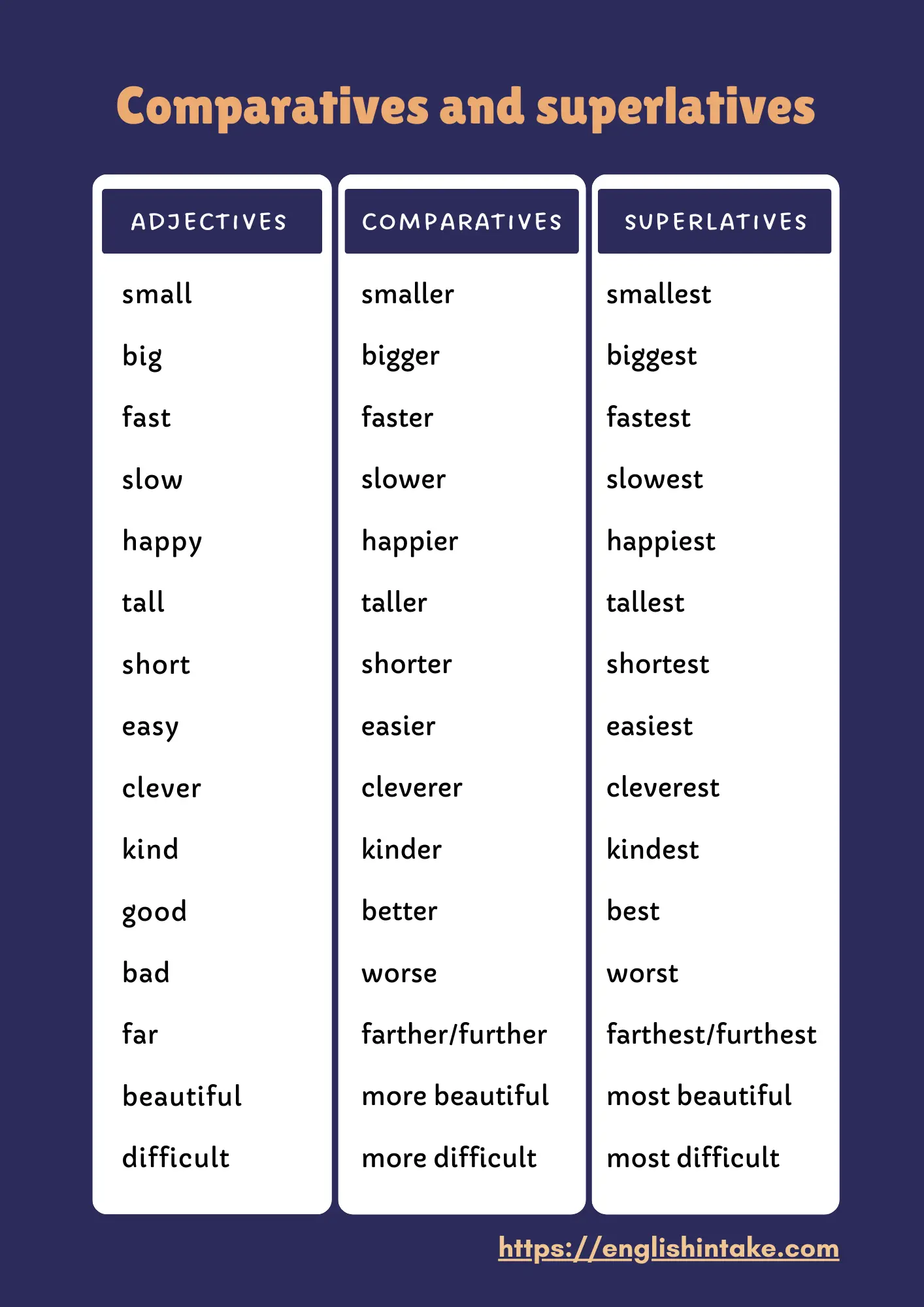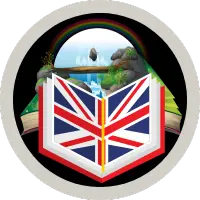Introduction
Comparatives and superlatives are forms of adjectives and adverbs that are used to compare persons, objects, or animals. We use superlatives when more than two persons, objects, or animals are being compared. This is to highlight who or what has the highest degree of quality within the group being compared.

Comparatives
Comparatives are formed by adding -er to the end of the adjective/adverb, or by using more before the adjective/adverb.
Noun (subject) + verb + comparative adjective + than + noun (object).
- Tom is taller than Jack.
- Light travels faster than sound.
- Today is hotter than yesterday.
- Metals conduct heat better than wood.
- The sun is bigger than the Earth.
Superlatives
Superlatives are formed by adding -est to the end of the adjective/adverb, or by using most before the adjective/adverb.
- Tom is the tallest in the class.
- What is the largest country in South America?
- I was the smartest student in my class.
- That was the best movie I’ve seen this year.
- He is the kindest person in our neighbourhood.
- Antarctica is the coldest place on Earth.
- This is the oldest building in the city.
- The Sahara is the hottest desert in the world.
Irregular forms
A small number of adjectives do not follow the regular -er/-est forms to make comparatives and superlatives (e.g., good, better, best; bad, worse, worst). The list below illustrates some common English adjectives and their comparative and superlative forms, along with example sentences.
1. better
She is better at chess than her brother.
2. the bestHe is the best player we’ve ever had.
1. worse
The sequel was worse than the original movie.
2. the worstThat was the worst film I’ve ever seen.
1. farther/further
We walked farther than we planned.
2. the farthest/furthestThis is the furthest I’ve ever been from home.
1. less
There is less sugar in this recipe than in the last one.
2. the leastOf all the candidates, he has the least experience.
1. more
There are more apples in this basket than in that one.
2. the mostShe has the most stickers in the class.
1. older/elder
My older sister is wiser than my younger brother.
2. the oldest/eldestHe is the oldest member of the club.
1. safer
Travelling by train is safer than travelling by car.
2. the safestStaying indoors during a storm is the safest option.
1. quicker
His response was quicker than expected.
2. the quickestEmail is the quickest way to reach her.
1. slower
This computer is slower than my old one.
2. the slowestThis is the slowest line at the supermarket.
1. weaker
Her handshake was weaker than I remembered.
2. the weakestThis is the weakest coffee I’ve ever tasted.
1. stronger
The coffee was stronger than she wanted it to be.
2. the strongestThis material is the strongest they offer.
1. younger
My younger brother is taller than me.
2. the youngestShe is the youngest person in the company.
1. older
This tradition is older than we thought.
2. the oldestThis is the oldest tree in the forest.
1. brighter
The moon is brighter tonight.
2. the brightestHe is the brightest student in the class.
1. darker
The room gets darker when the sun sets.
2. the darkestThis shade of blue is the darkest available.
1. smaller
This apartment is smaller than the last one.
2. the smallestShe chose the smallest puppy of the litter.
1. larger
We need a larger house for the family.
2. the largestIt’s the largest museum in the city.
1. hotter
Today is hotter than yesterday.
2. the hottestLast summer was the hottest on record.
1. colder
The water feels colder in the morning.
2. the coldestWhere is the coldest place on Earth?
1. louder
The music was louder than usual last night.
2. the loudestShe has the loudest laugh I’ve ever heard.
1. quieter
This room is quieter than the one upstairs.
2. the quietestEarly mornings are the quietest times in the city.
1. harder
The quiz today was harder than the last one.
2. the hardestThat was the hardest decision I’ve ever had to make.
1. easier
It’s easier to learn with visual aids.
2. the easiestThis is the easiest recipe for beginners.
1. narrower
This path is narrower than the main road.
2. the narrowestThis alley is the narrowest in the whole town.
1. broader
His interests have become broader over the years.
2. the broadestThe river is widest at the broadest point near the bridge.
1. deeper
The ocean gets deeper a few miles from shore.
2. the deepestThe Mariana Trench is the deepest part of the world’s oceans.
1. shallower
The water becomes shallower near the beach.
2. the shallowestThe kiddie pool is the shallowest in the water park.
1. higher
Prices are higher during the holiday season.
2. the highestThe mountain peak is the highest point in the region.
1. lower
Temperatures are lower at night.
2. the lowestThe valley is the lowest point in the area.
1. nicer
This hotel is nicer than the one we stayed in last time.
2. the nicestShe is the nicest person I’ve ever met.
1. simpler
The instructions should be simpler for everyone to understand.
2. the simplestThis is the simplest solution to the problem.
1. thinner
This phone model is thinner than the previous one.
2. the thinnestThis ice sheet is the thinnest we’ve recorded in years.
1. fatter
The cat has gotten fatter since we last saw her.
2. the fattestHe won the contest for the fattest pumpkin in the county.
1. more beautiful
The view from the hill is more beautiful than from the ground.
2. the most beautifulThis painting is the most beautiful one in the gallery.
1. more complex
The problem seems more complex than we initially thought.
2. the most complexThis is the most complex equation in the textbook.
1. more difficult
As the course progresses, the tests become more difficult.
2. the most difficultChoosing a favourite was the most difficult decision.
1. more expensive
Luxury cars are more expensive than standard models.
2. the most expensiveThis is the most expensive piece of jewellery in the store.
1. more comfortable
This chair is more comfortable than the one in my office.
2. the most comfortableThese are the most comfortable shoes I’ve ever worn.
1. more interesting
The second book was more interesting than the first one.
2. the most interestingThis is the most interesting case I’ve ever worked on.
1. more intelligent
Dolphins are more intelligent than many other animals.
2. the most intelligentShe is the most intelligent student in our class.
1. more dangerous
Climbing without proper gear is more dangerous than with it.
2. the most dangerousThis is the most dangerous road in the country.
1. more popular
Streaming services are becoming more popular than cable TV.
2. the most popularThis is the most popular song on the charts this week.
1. more sophisticated
Today’s smartphones are more sophisticated than earlier models.
2. the most sophisticatedThis security system is the most sophisticated on the market.
1. more creative
Brainstorming sessions are more creative in the morning.
2. the most creativeHer solution to the problem was the most creative.
1. more efficient
LED bulbs are more efficient than fluorescent lights.
2. the most efficientThis machine is the most efficient in energy consumption.
1. more effective
Practising every day is more effective than cramming.
2. the most effectiveThis medicine is the most effective for treating malaria.
1. more flexible
Yoga makes your body more flexible than before.
2. the most flexibleThis material is the most flexible for our needs.
1. more reliable
Public transportation is more reliable in this city than in others.
2. the most reliableShe is the most reliable member of our team.
1. more accessible
Online courses are more accessible than traditional classes.
2. the most accessibleThis park is the most accessible for people with disabilities.
1. more enjoyable
Travelling with friends is more enjoyable than going alone.
2. the most enjoyableThat vacation was the most enjoyable I’ve ever had.
1. more favourable
The weather is more favourable for a hike today than yesterday.
2. the most favourableThis contract offers the most favourable terms.
1. more peaceful
The countryside is more peaceful than the city.
2. the most peacefulThis spot by the lake is the most peaceful place I know.
1. more respectful
Being more respectful in conversation can improve relationships.
2. the most respectfulShe is the most respectful student in class.
1. more suitable
This bicycle is more suitable for teenagers.
2. the most suitableOf all the applicants, he is the most suitable for the job.
